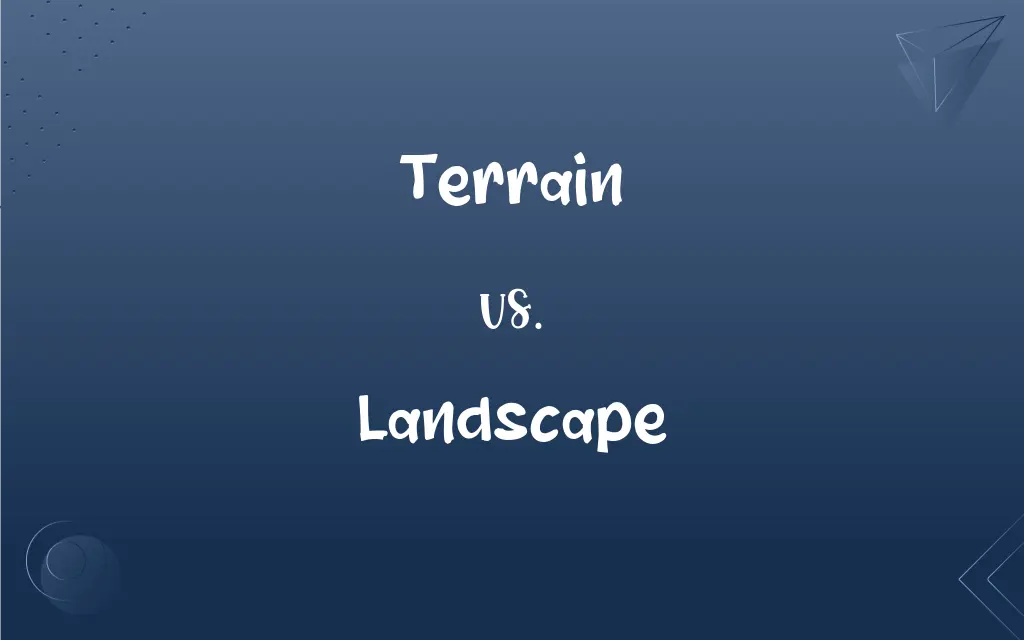Terrain vs. Landscape: What's the Difference?
By Aimie Carlson & Harlon Moss || Updated on May 22, 2024
Terrain refers to the physical features of a piece of land, such as its elevation, slope, and natural formations. Landscape, on the other hand, encompasses the overall appearance of an area, including both natural and human-made elements.

Key Differences
Terrain refers to the physical characteristics of a specific piece of land. This includes the land's elevation, slope, and natural formations such as mountains, valleys, and plains. These features are often analyzed for purposes such as construction, agriculture, and military strategy. Landscape, in contrast, refers to the overall appearance and aesthetic of an area. This includes not only the natural features such as trees, rivers, and hills but also human-made elements like buildings, roads, and agricultural fields.
While terrain deals specifically with the measurable and physical aspects of land, landscape encompasses a broader view that includes both natural and artificial elements. Terrain can affect the landscape by determining the natural features present, but landscape considers how these features interact with human modifications.
Terrain is often used in scientific and technical contexts, whereas landscape is more commonly discussed in artistic and cultural contexts. For instance, geologists and military planners might focus on terrain, while artists and urban planners focus on landscape.
When planning infrastructure, terrain is critical for understanding the physical constraints and necessary adjustments, while landscape is important for ensuring the aesthetic integration and functionality of the space. Both terms are essential in their respective contexts and offer valuable perspectives on the study and appreciation of land.
Comparison Chart
Definition
Physical features of land
Overall appearance of an area
ADVERTISEMENT
Focus
Elevation, slope, natural formations
Natural and human-made elements
Context
Scientific, technical
Artistic, cultural
Importance
Physical challenges and opportunities
Aesthetic appeal and design
Applications
Construction, agriculture, military strategy
Architecture, urban planning, environmental design
Terrain and Landscape Definitions
Terrain
The physical features of a piece of land.
The mountainous terrain made construction difficult.
ADVERTISEMENT
Landscape
The visual and aesthetic aspects of a region.
The picturesque landscape attracted many artists.
Terrain
The ground's texture and layout.
The terrain was flat and ideal for farming.
Landscape
The arrangement and interaction of natural and artificial components.
The urban landscape blends modern buildings with green spaces.
Terrain
The landscape's physical characteristics, such as elevation and slope.
The rocky terrain required specialized climbing equipment.
Landscape
The overall appearance of an area, including natural and human-made elements.
The landscape features a mix of forests and fields.
Terrain
The natural formations present in an area.
The terrain includes a variety of hills and valleys.
Landscape
The view or scenery of a particular area.
The landscape from the top of the hill was breathtaking.
Terrain
The surface features of a region.
The rough terrain challenged the expedition team.
Landscape
An expanse of scenery that can be seen in a single view
A desert landscape.
Terrain
An area of land; ground
Climbed a tree to view the surrounding terrain.
Landscape
A picture depicting an expanse of scenery.
Terrain
A particular geographic area; a region
A guide who knows this terrain well.
Landscape
The branch of art dealing with the representation of natural scenery.
Terrain
The surface features of an area of land; topography
Boots designed for rugged terrain.
Landscape
The aspect of the land characteristic of a particular region
A bleak New England winter landscape.
Terrain
(also tĕrān) Variant of terrane.
Landscape
Grounds that have been landscaped
Liked the house especially for its landscape.
Terrain
(geology) A single, distinctive rock formation; an area having a preponderance of a particular rock or group of rocks.
Landscape
An extensive mental view; an interior prospect
"They occupy the whole landscape of my thought" (James Thurber).
Terrain
An area of land or the particular features of it.
The race will be run over a variety of terrain, including grass and sand.
Landscape
The orientation of a page such that the shorter side runs from top to bottom.
Terrain
The surface of the earth; the ground.
This approach requires the aircraft to stay at an altitude of at least 3000 feet MSL until crossing the VOR in order to maintain terrain clearance.
Controlled flight into terrain
TOO LOW, TERRAIN
Landscape
To adorn or improve (a section of ground) by contouring and by planting flowers, shrubs, or trees.
Terrain
A piece of ground having specific characteristics or military potential;
They decided to attack across the rocky terrain
Landscape
To arrange grounds aesthetically or maintain grounds as a profession.
Landscape
A portion of land or territory which the eye can comprehend in a single view, including all the objects it contains.
Landscape
A sociological aspect of a physical area.
Landscape
A picture representing a real or imaginary scene by land or sea, the main subject being the general aspect of nature, as fields, hills, forests, water, etc.
Landscape
The pictorial aspect of a country.
Landscape
A mode of printing where the horizontal sides are longer than the vertical sides
Landscape
A space, indoor or outdoor and natural or man-made (as in "designed landscape")
Landscape
(figuratively) a situation that is presented, a scenario
The software patent landscape has changed considerably in the last years
Landscape
To create or maintain a landscape.
Landscape
A portion of land or territory which the eye can comprehend in a single view, including all the objects it contains.
Landscape
A picture representing a scene by land or sea, actual or fancied, the chief subject being the general aspect of nature, as fields, hills, forests, water. etc. Compare seascape.
Landscape
The pictorial aspect of a country.
The landscape of his native country had taken hold on his heart.
Landscape
An expanse of scenery that can be seen in a single view
Landscape
Painting depicting an expanse of natural scenery
Landscape
A genre of art dealing with the depiction of natural scenery
Landscape
An extensive mental viewpoint;
The political landscape looks bleak without a change of administration
We changed the landscape for solving the proble of payroll inequity
Landscape
Embellish with plants;
Let's landscape the yard
Landscape
Do landscape gardening;
My sons landscapes for corporations and earns a good living
Landscape
The design and layout of an outdoor space.
The landscape of the park was carefully planned.
FAQs
Can terrain affect landscape?
Yes, terrain can influence the natural features present in a landscape, affecting its overall appearance.
Why is terrain important in construction?
Understanding terrain helps identify physical challenges and opportunities, guiding building design and placement.
What is terrain?
Terrain refers to the physical features of a piece of land, such as its elevation and natural formations.
What does landscape mean?
Landscape encompasses the overall appearance of an area, including both natural and human-made elements.
How does terrain differ from landscape?
Terrain focuses on physical characteristics like elevation and slope, whereas landscape includes both natural features and human modifications.
How is landscape used in urban planning?
Landscape considers the aesthetic and functional integration of natural and human-made elements in urban areas.
What fields focus on terrain?
Geology, military strategy, and agriculture often focus on terrain.
Is terrain static or can it change?
Terrain can change over time due to natural processes like erosion and human activities like excavation.
Who typically studies landscapes?
Artists, architects, urban planners, and environmental designers study landscapes.
How do artists use the concept of landscape?
Artists use landscape to capture the visual and aesthetic qualities of an area in their work.
How does terrain impact travel and transportation?
Terrain influences the construction of roads, bridges, and other infrastructure, affecting travel efficiency and safety.
Is terrain relevant to agriculture?
Yes, terrain affects soil quality, water drainage, and the suitability of land for different crops.
What is the role of terrain in military strategy?
Terrain analysis helps determine the best routes, defensive positions, and logistical planning in military operations.
Can landscape design improve urban living?
Yes, well-designed landscapes can enhance the beauty, functionality, and environmental quality of urban spaces.
What elements are considered in landscape architecture?
Landscape architecture considers plants, water features, buildings, paths, and overall spatial arrangement.
Why is terrain analysis crucial in disaster management?
Understanding terrain helps predict natural disaster impact areas and plan evacuation routes and emergency responses.
Can landscape design contribute to sustainability?
Yes, sustainable landscape design incorporates native plants, water conservation, and eco-friendly practices.
How do landscapes evolve?
Landscapes evolve through natural growth, weather patterns, and human development.
What is the aesthetic value of landscape in tourism?
Scenic landscapes attract tourists, boosting local economies and promoting cultural appreciation.
How does terrain influence biodiversity?
Different terrains support varied ecosystems, influencing plant and animal species distribution.
About Author
Written by
Aimie CarlsonAimie Carlson, holding a master's degree in English literature, is a fervent English language enthusiast. She lends her writing talents to Difference Wiki, a prominent website that specializes in comparisons, offering readers insightful analyses that both captivate and inform.
Co-written by
Harlon MossHarlon is a seasoned quality moderator and accomplished content writer for Difference Wiki. An alumnus of the prestigious University of California, he earned his degree in Computer Science. Leveraging his academic background, Harlon brings a meticulous and informed perspective to his work, ensuring content accuracy and excellence.































































